


The article underscores ten promising careers in clinical research that can significantly enhance one's professional trajectory within the healthcare field. It highlights the increasing demand for skilled professionals, competitive salaries, and opportunities for advancement. Furthermore, it emphasizes the ability to make meaningful contributions to medical advancements, all of which underscore the appeal of pursuing a career in this dynamic industry.
The clinical research sector stands on the brink of a transformative boom, propelled by an urgent demand for innovative medical solutions and therapies. This expansion offers a myriad of career opportunities, ranging from:
Each occupying a crucial position in the advancement of healthcare. As the need for skilled professionals escalates, aspiring individuals must navigate this evolving landscape to secure their place in a field that not only promises stability but also provides the chance to contribute to life-saving medical advancements.
How can one effectively position themselves in this dynamic environment?
bioaccess® distinguishes itself in the medical study field by facilitating rapid ethical approvals within 4 to 6 weeks and achieving patient enrollment rates that are 50% faster than traditional methods. This efficiency accelerates the pace of research studies and cultivates an appealing environment for individuals eager to advance their careers.
With over 15 years of industry experience, bioaccess® nurtures a collaborative atmosphere for Medtech, Biopharma, and Radiopharma innovators, empowering employees to engage in transformative healthcare advancements. By joining bioaccess®, you become part of a dynamic team at the forefront of medical research, where your contributions can lead to significant breakthroughs in healthcare.
The organization’s dedication to employee satisfaction is evident in its supportive culture, which promotes professional growth and development, making it an ideal choice for those aiming to make a meaningful impact in the field.
Furthermore, bioaccess® offers comprehensive services that include participant recruitment and trial data management, supported by a network of pre-qualified sites activated in under 8 weeks, ensuring a thorough approach to research trials.
The healthcare sector is poised for remarkable growth, propelled by an urgent demand for innovative treatments and therapies. Projections indicate that employment opportunities for medical scientists, including those in medical studies, will surge by 17% from 2020 to 2030. This increase in demand is anticipated to generate a multitude of job openings, particularly in careers in clinical research, ranging from Clinical Research Associates to regulatory affairs specialists.
As organizations navigate evolving regulations and technological advancements, the landscape is becoming increasingly dynamic, emphasizing patient-centric models and diverse hiring practices. By 2025, the global clinical investigation market is expected to surpass $80 billion, reflecting a significant growth trajectory that will create numerous careers in clinical research, driven by the need for specialized skills in data management, regulatory compliance, and clinical trial administration.
This expansion not only ensures your future in a stable industry but also positions you at the forefront of medical science, enhancing patient outcomes and advancing healthcare.
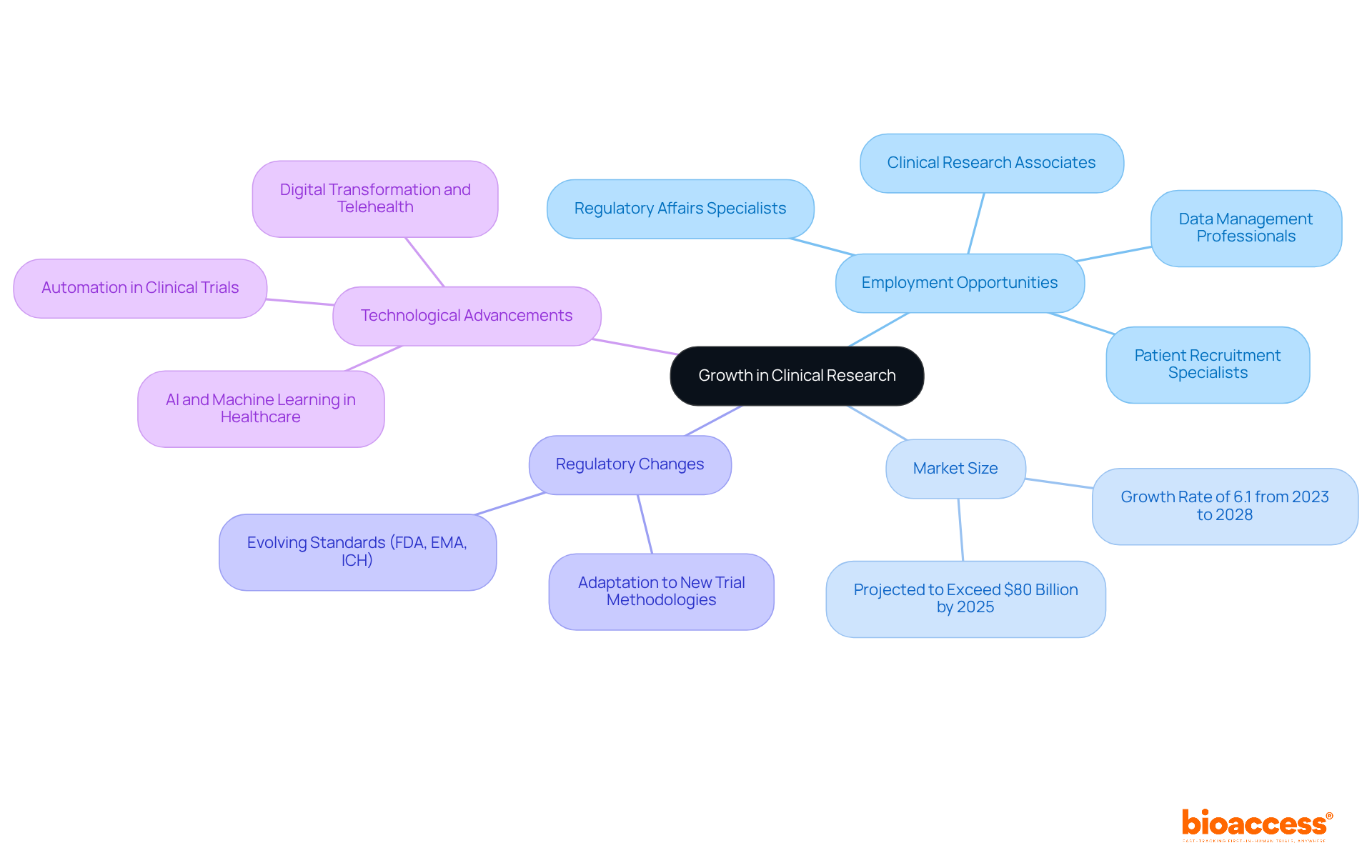
Clinical studies present a wealth of job opportunities, including careers in clinical research such as:
Each position is vital to the study continuum, overseeing trials and ensuring compliance with regulatory standards. With appropriate training and certifications, individuals can progress to senior roles like:
These roles are vital for advancing careers in clinical research and fostering continuous career development. Notably, the workforce in careers in clinical research is projected to grow by 14% annually, highlighting the increasing demand for skilled professionals.
Success stories are plentiful, with numerous CRAs advancing from CRC positions, utilizing their experience to improve patient engagement and trial efficiency. Furthermore, companies like bioaccess® are addressing challenges in patient recruitment by providing comprehensive trial management services, which encompass:
This can significantly reduce approval timelines to 6-8 weeks, compared to the typical 6-12 months in the US/EU. This dynamic field not only paves the way for personal growth but also plays a crucial role in advancing healthcare and bolstering local economies through job creation, particularly in careers in clinical research, and economic development.
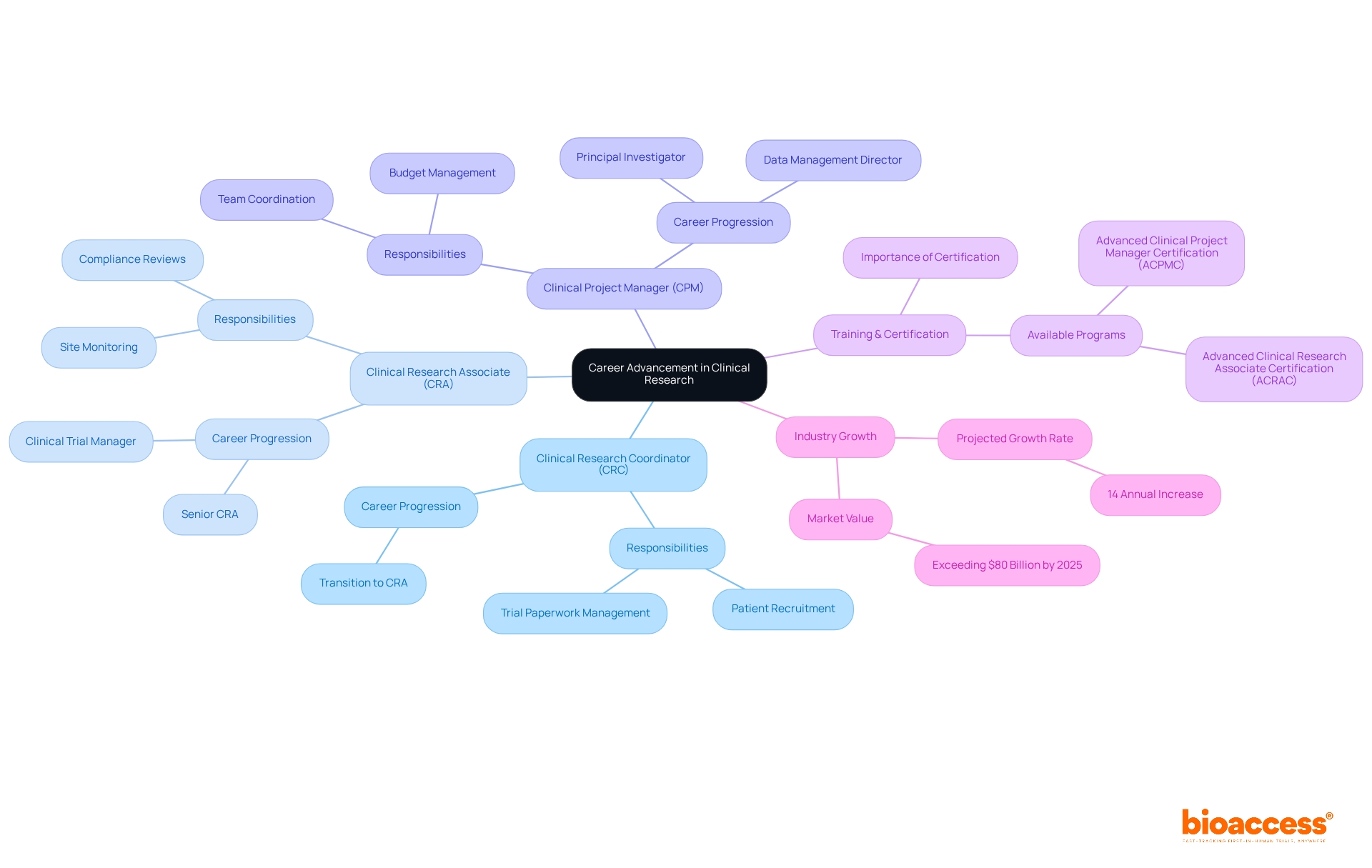
A profession in medical studies offers a unique opportunity to directly influence life-saving advancements in healthcare. Each study plays a vital role in the development of new treatments, therapies, and medical devices that can significantly enhance or save lives.
For instance, research studies have been instrumental in bringing innovative therapies to market, with success rates for medications undergoing research averaging around 14%. Although the journey from discovery to approval can span 10 to 15 years, the potential for breakthroughs is substantial.
Real-world examples abound, such as the rapid advancement of mRNA vaccines during the COVID-19 pandemic, which showcased the adaptability of research in addressing urgent health crises. Furthermore, oncology trials, which constitute 24% of all clinical trials, have led to remarkable progress in cancer treatment, improving survival rates and quality of life for patients.
Engaging in careers in clinical research not only advances your career but also positions you as a crucial contributor to enhancing the health and well-being of individuals and communities worldwide.
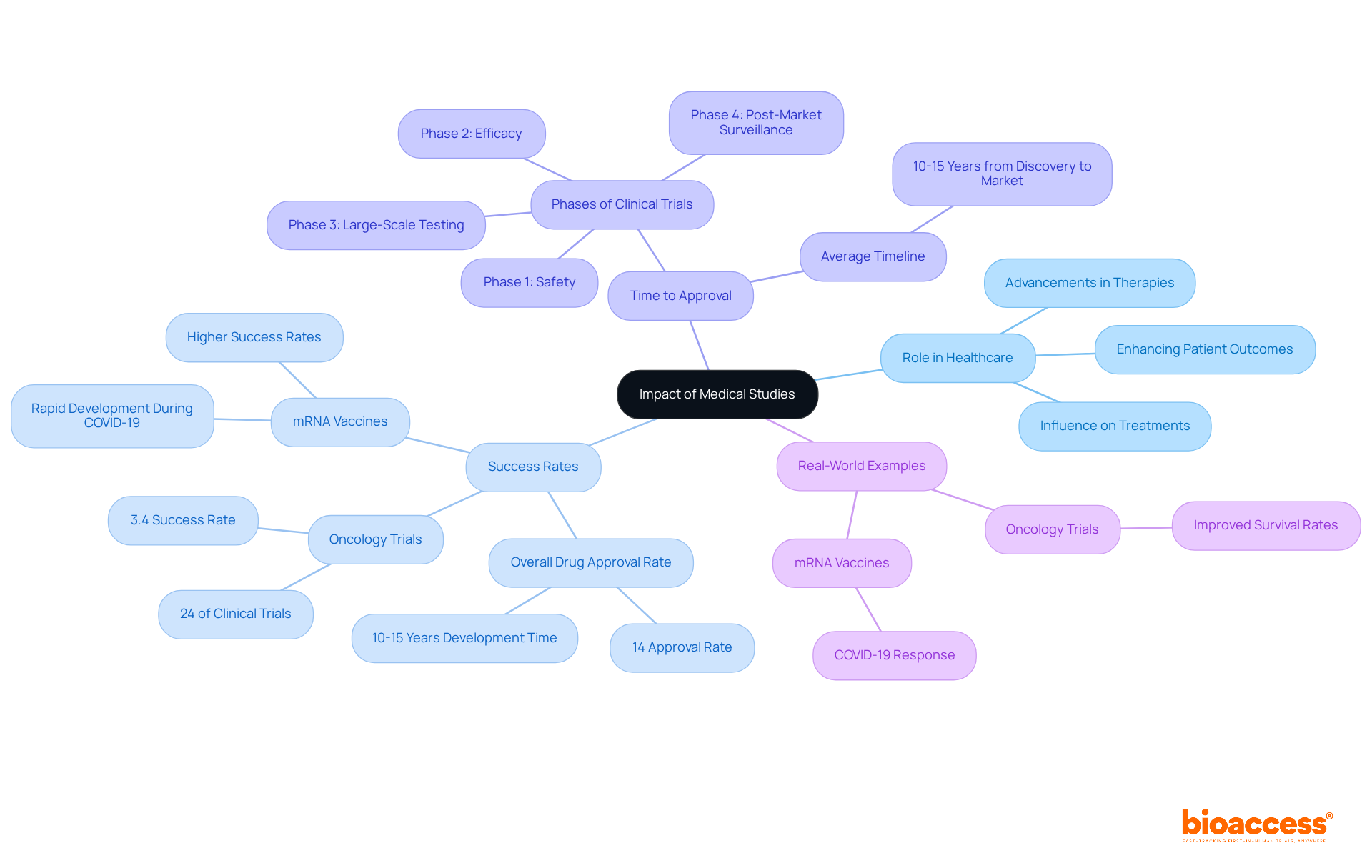
Clinical study specialists benefit from attractive compensation packages that reflect their specialized skills and the critical nature of their roles. Entry-level positions, such as Clinical Research Coordinators, typically earn between $50,000 and $60,000 annually. In contrast, experienced professionals, like Clinical Project Managers, can command salaries exceeding $110,000. The average salary for Clinical Research Associates stands at approximately $67,000, while senior roles average around $101,000.
With the medical study sector projected to surpass $80 billion by 2025, the demand for skilled individuals pursuing careers in clinical research is expected to grow by 8% from 2021 to 2031. This trend will further enhance opportunities for lucrative remuneration packages, often inclusive of bonuses and comprehensive benefits.
In this competitive landscape, the importance of certifications cannot be overstated; certified coordinators in the medical field can earn 10-20% more than their non-certified counterparts, highlighting the value of advanced qualifications in securing higher salaries and fostering careers in clinical research.
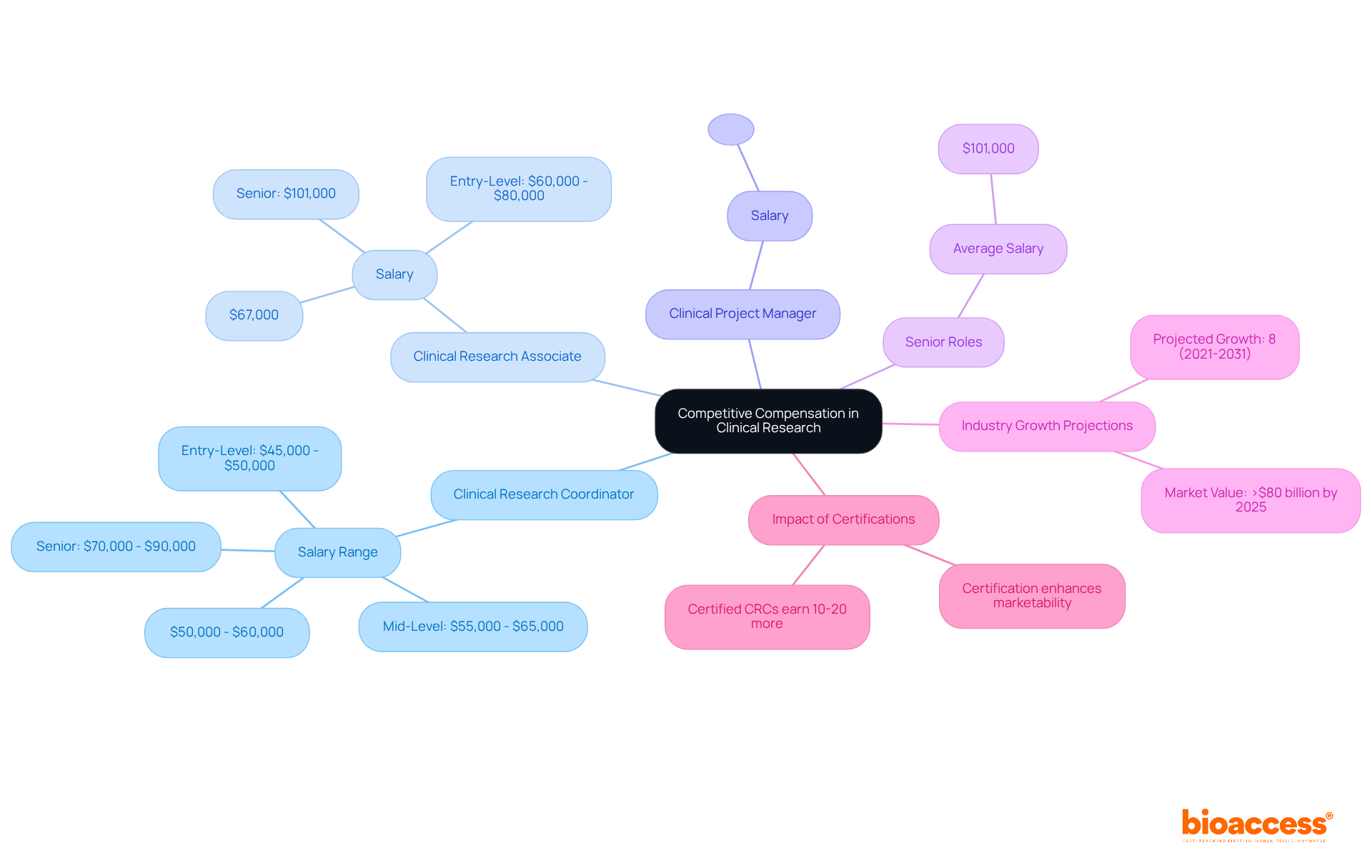
Collaboration is vital in clinical studies, which is why professionals pursuing careers in clinical research must work closely with colleagues, sponsors, and regulatory bodies. This teamwork fosters a supportive environment where ideas can flow freely, and challenges are tackled collectively.
At bioaccess®, the role of our Advisory Board is crucial; their expertise in regulatory affairs, particularly through the contributions of Ana and Katherine, enhances our trials in Medtech and Biopharma. In this collaborative setting, individuals can sharpen their skills, gain insights from diverse perspectives, and contribute to a culture of innovation and excellence.
Effective teamwork not only propels project success but also enhances employee satisfaction and retention. Studies reveal that organizations prioritizing collaboration experience a 29% increase in profits. Furthermore, 37% of employees recognize the importance of collaboration in careers in clinical research, underscoring its pivotal role in medical studies.
As Bruce Temkin observed, customers who have a positive experience are more inclined to recommend the company, highlighting how teamwork influences both internal dynamics and external outcomes. Additionally, effective communication leads to 4.5 times greater talent retention, showcasing the benefits of collaboration in retaining skilled professionals.
By embracing a cooperative mindset and leveraging peer collaboration tools, which 81% of employees rate positively, those in careers in clinical research can significantly impact the advancement of medical innovations. Notably, Dr. John B. Simpson, CEO of Avinger, has shared valuable insights on successful collaborations with LATAM CRO experts during OCT-guided atherectomy trials in Cali, Colombia, further demonstrating the significance of teamwork in achieving excellence in research.
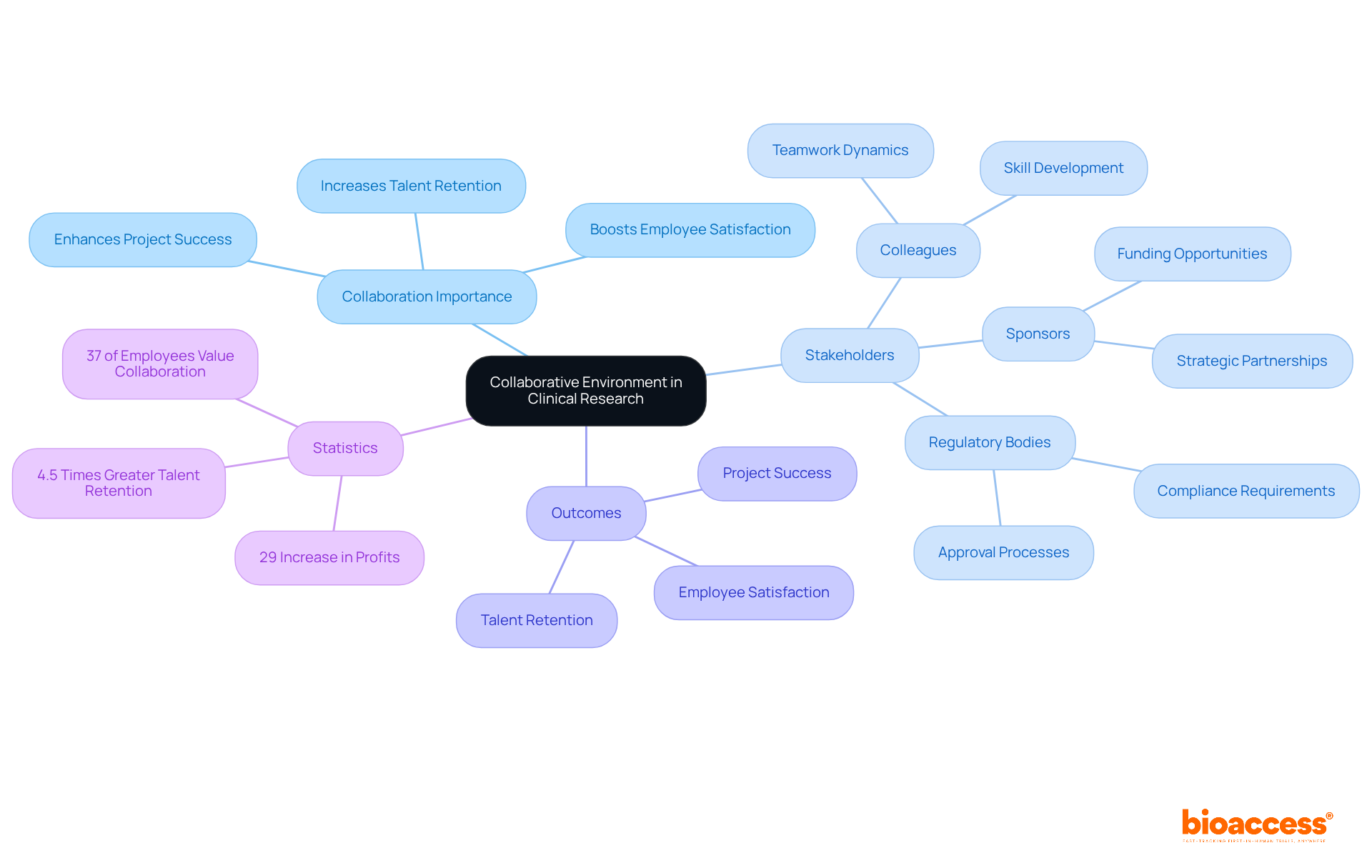
Many healthcare study roles currently offer adaptable work options, which are essential for individuals seeking a healthy work-life balance. The availability of remote work and flexible hours enables individuals to effectively manage personal commitments while engaging in impactful work. This flexibility is particularly appealing to those striving to align their career aspirations with family and personal life.
In fact, studies reveal that:
As organizations increasingly recognize the importance of adaptability, positions in health studies are evolving to meet the diverse needs of the workforce, ensuring that individuals can thrive both personally and professionally. Moreover, a balance between work and personal life positively influences job performance and satisfaction, emphasizing the crucial role of flexible work arrangements in enhancing employee contentment and productivity.
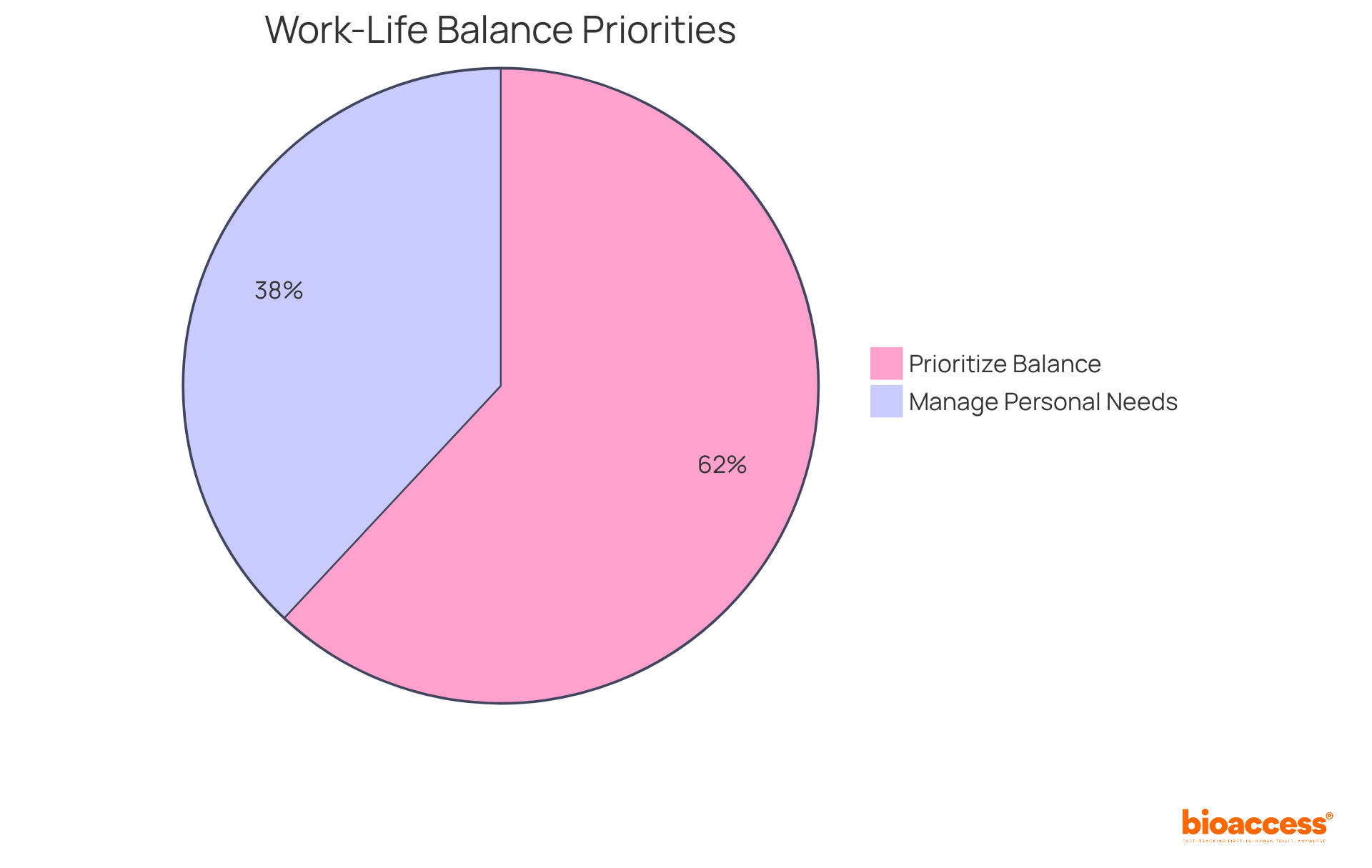
The field of healthcare studies presents a distinctly approachable opportunity, particularly for those seeking entry-level positions. Roles such as Clinical Research Assistant and Clinical Trial Assistant, which are part of careers in clinical research, typically do not require a formal degree, enabling individuals with relevant experience or certifications to enter these roles. This inclusivity cultivates a diverse candidate pool, inviting those transitioning from various industries alongside individuals with backgrounds in healthcare or life sciences.
For example, acquiring certifications like Good Clinical Practice (GCP) can significantly enhance a candidate's profile, rendering them more appealing to prospective employers. Moreover, numerous success stories abound, with many individuals successfully transitioning into healthcare roles, often reporting higher job satisfaction and compensation compared to their previous positions.
As the industry continues to evolve, the demand for skilled professionals in careers in clinical research is on the rise, highlighting the importance of strategic job transitions into this dynamic field.
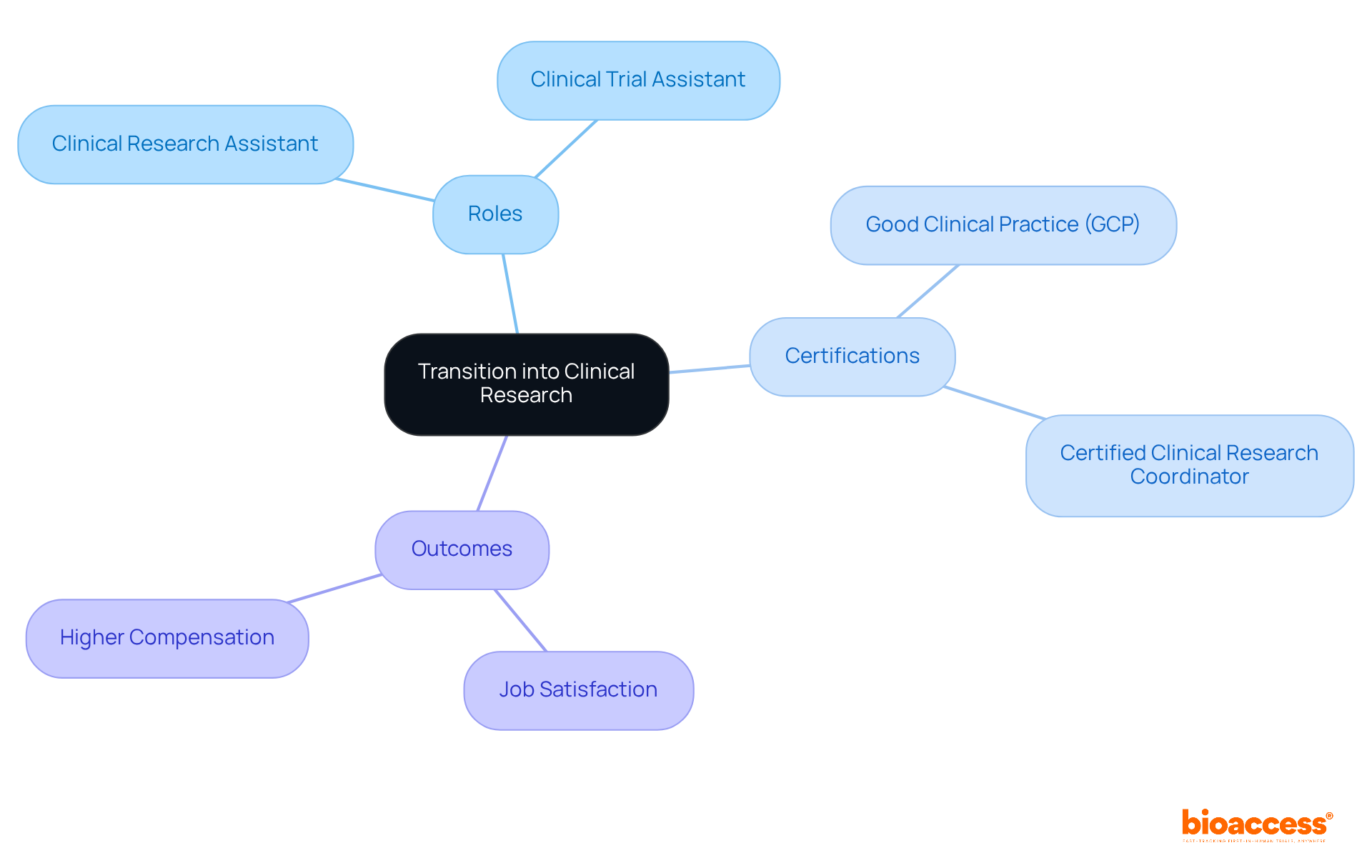
Networking serves as a crucial pillar for professional growth in careers in clinical research. Engaging in industry conferences, joining trade associations, and connecting with colleagues can significantly enhance your careers in clinical research. Such interactions not only elevate your visibility in careers in clinical research but also forge pathways to mentorship opportunities and valuable insights that can shape your professional journey.
For instance, numerous experts have secured job offers through connections made at networking events, underscoring the tangible benefits of cultivating relationships. Additionally, membership in occupational organizations provides access to exclusive resources and industry insights that can enhance your careers in clinical research.
In a landscape where 80% of positions are filled through networking, nurturing these relationships is not merely advantageous; it is essential for success in careers in clinical research. Moreover, it is vital to acknowledge that 70% of jobs remain unpublished, highlighting the critical role of networking in revealing hidden opportunities.
Nevertheless, experts frequently face challenges in networking, such as time constraints, which can hinder their ability to engage effectively. As Michele Jennae aptly notes, 'Networking is not about just connecting people. It's about connecting people with people, people with ideas, and people with opportunities.
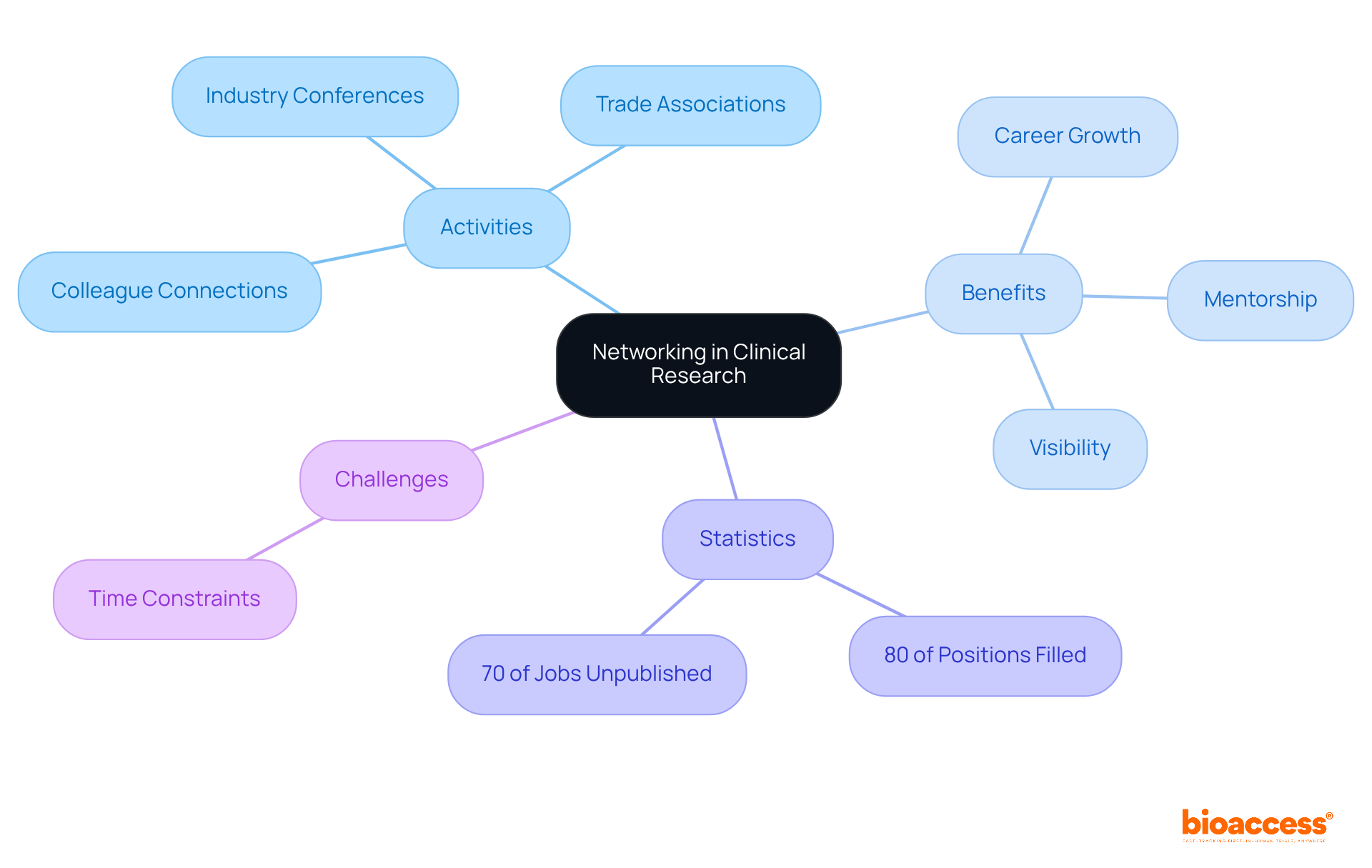
A profession in medical studies is highly attractive, not only for its capacity to influence healthcare but also for the extensive benefits packages that accompany it. These packages typically encompass essential health insurance, retirement plans, and generous paid time off—benefits that 63% of employees regard as essential for maintaining work-life balance.
Additionally, numerous organizations provide opportunities for skill advancement, including tuition reimbursement and wellness initiatives, fostering both personal and professional growth. Such benefits play a crucial role in overall job satisfaction, with studies revealing that employees who are satisfied with their benefits are 13% more likely to stay with their employer for over three years.
Moreover, 80% of employees would choose a job with benefits over one offering higher pay but no benefits, highlighting the critical role of benefits in employee retention. This emphasis on employee well-being and satisfaction positions careers in clinical research as a financially sound and rewarding choice, attracting aspiring professionals eager to make a meaningful impact while enjoying robust support from their employers.
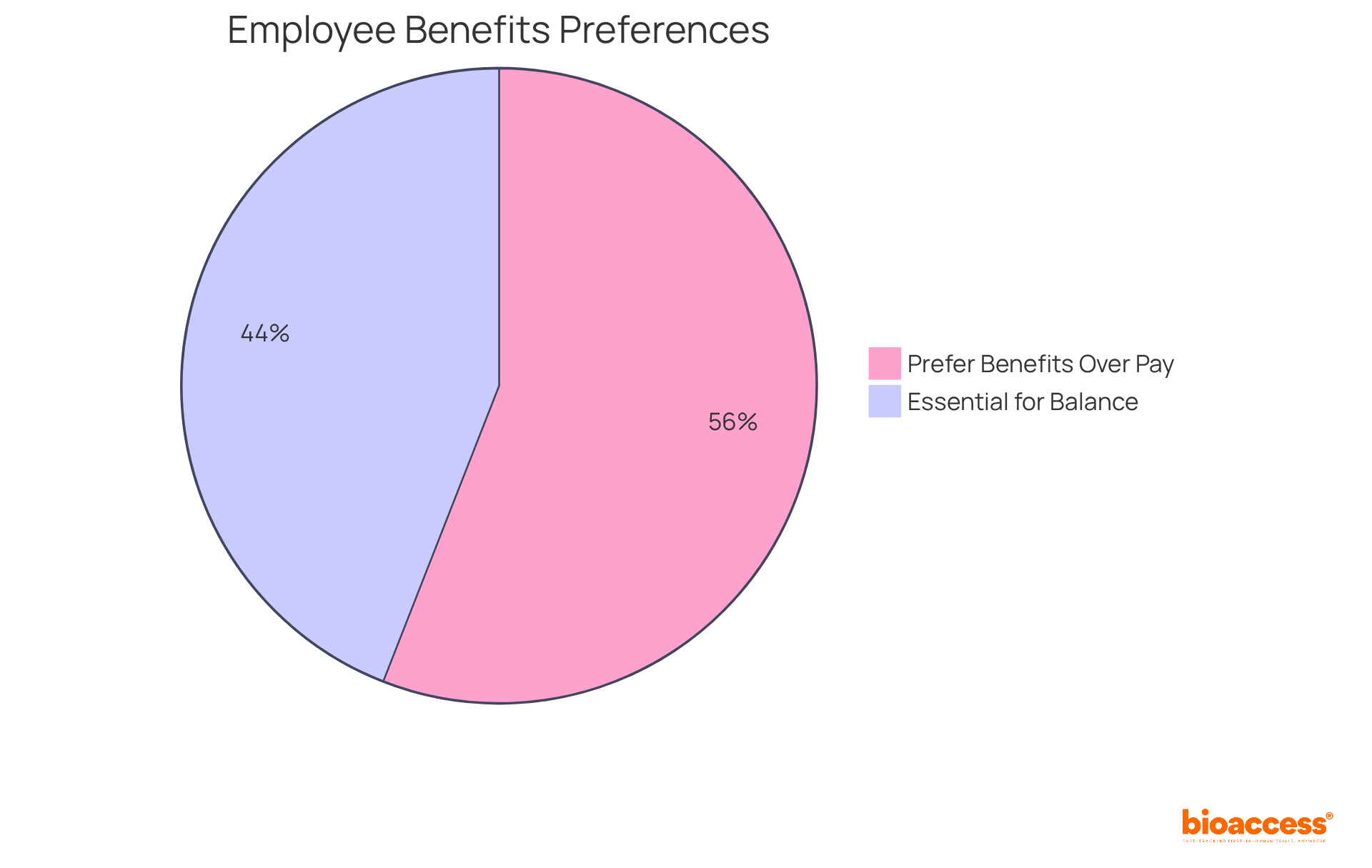
The landscape of clinical research is rapidly evolving, presenting an array of promising career opportunities that not only enhance personal growth but also contribute significantly to the advancement of healthcare. This article highlights the diverse paths within this field, from entry-level positions to senior roles, emphasizing the importance of specialized skills and certifications that can lead to lucrative compensation and job satisfaction.
Key insights reveal the growing demand for clinical research professionals, driven by an expanding market projected to exceed $80 billion by 2025. Various roles, such as:
are essential in navigating the complexities of medical studies. Furthermore, the supportive and collaborative culture within organizations like bioaccess® fosters an environment where innovation thrives, ultimately leading to life-saving medical advancements.
Engaging in a career in clinical research transcends personal achievement; it’s about making a meaningful impact on global health. As the demand for skilled professionals continues to rise, aspiring individuals are encouraged to explore this dynamic field, leverage networking opportunities, and embrace the flexibility and benefits that come with these roles. By doing so, they can position themselves at the forefront of medical innovation, playing a vital role in shaping the future of healthcare.
What is bioaccess® and what makes it unique in clinical research?
bioaccess® is a leading Contract Research Organization (CRO) that facilitates rapid ethical approvals within 4 to 6 weeks and achieves patient enrollment rates that are 50% faster than traditional methods, accelerating the pace of research studies.
How does bioaccess® support career advancement?
With over 15 years of industry experience, bioaccess® fosters a collaborative atmosphere for Medtech, Biopharma, and Radiopharma innovators, allowing employees to engage in transformative healthcare advancements and contributing to significant breakthroughs in medical research.
What kind of work culture does bioaccess® promote?
bioaccess® promotes a supportive culture that emphasizes employee satisfaction, professional growth, and development, making it an ideal choice for individuals looking to make a meaningful impact in the field.
What services does bioaccess® offer for clinical trials?
bioaccess® provides comprehensive services including participant recruitment and trial data management, supported by a network of pre-qualified sites activated in under 8 weeks, ensuring a thorough approach to research trials.
What is the projected growth for careers in clinical research?
Employment opportunities for medical scientists, including those in clinical research, are projected to surge by 17% from 2020 to 2030, indicating a strong demand for various roles in the field.
What types of job opportunities exist in clinical research?
Job opportunities include positions such as Clinical Research Coordinator (CRC), Clinical Research Associate (CRA), and Clinical Project Manager, with potential advancement to senior roles like Clinical Trial Manager and Principal Investigator.
How does the clinical research field support career development?
The workforce in clinical research is projected to grow by 14% annually, and many professionals, such as CRAs, often advance from CRC positions, leveraging their experience to improve trial efficiency and patient engagement.
What challenges does bioaccess® address in clinical research?
bioaccess® addresses challenges in patient recruitment by providing comprehensive trial management services, including feasibility studies, site selection, compliance reviews, and expedited regulatory approvals, significantly reducing approval timelines.
What is the expected value of the global clinical investigation market by 2025?
The global clinical investigation market is expected to surpass $80 billion by 2025, reflecting significant growth and creating numerous careers in clinical research driven by the need for specialized skills.